Dan by Joanna Ruocco
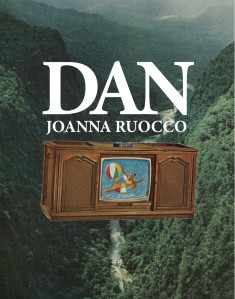 Dan
Dan
by Joanna Ruocco
Dorothy, A Publishing Project, Oct. 2014
152 pages / $16 Buy from Dorothy or Amazon
Joanna Ruocco is a word wonder maker and in Ruocco’s newest novel, Dan (due out from Dorothy, A Publishing Project Oct. 1st) she has managed to not only build unbelievable structures with words but to also build an actual city. This city is Dan. And it is a place we have been before. Or maybe we haven’t. It’s a place shoved so far back into the recesses of the mind that only through reading her words do we realize that those feelings, the emotions she constructs, are already within. Reading Dan is like having a bot worm medically expelled from your body. You suspected there was something wrong, something in you that wasn’t right, and by mysterious ways of medical linguistics Ruocco has not only identified the parasite, but found it in the deep recesses of your soul and pulled it out through your tear ducts for you to see and examine. Or perhaps reading Dan is more like the act of having your ears cleaned. With each page a tube is stuck deeper within your drum and Dan mounts, pushing warm alien water into your skull, pulling out chunks of orange gunk so big you end up questioning your true size. I conceived my ear canal to be X size. But, my god, my ear canal is triple X. And dear lord can I hear better. After reading Dan you’ll hear things in the way you speak, in the way others speak, that you simply did not hear before.
Within the narrative many of these linguistic nuggets come by way of male characters giving of prescriptive advice. Our protagonist’s father, Zeno Zuzzo, looks over at a group of loitering ladies and warns:
“Do you see the ears?…Those women are conspiring, always conspiring. Why else would they need ears so close to their mouths? They’re whispering things to themselves, Melba. They’re stirring themselves up.”
These bizarre, otherworldly observations are gifted to us throughout. They are occurrences that could only take place in Dan, or are perhaps what make up Dan itself.
Thus Ruocco leads us inside ourselves by way of location. Dan is a small male-heavy hamlet in the middle of somewhere. The residents of Dan know of nowhere. Or maybe there is nowhere else. Some residents do leave, but they don’t so much leave as disappear. Our charismatic protagonist, Melba Zuzzo, for a period of time thought Dan was island. And maybe it is. Or maybe isn’t. In Dan, things are turned not upside down, but sideways, just tilted enough so we can recognize them. The only other female we meet in Dan is Melba’s mother, Gigi Zuzzo, who tirelessly requests the absurd. Melba, did you have the hair on your forearms removed? When was the last time you went shopping? Gigi Zuzzo says, Melba you do not shop enough and this will be the end of you. How else is one to expand their horizons except by way of consumerism? The conversations that Melba has with Gigi, like all the conversations Melba has, are at once absurd but intimately familiar. Have I had this conversation with my mother before? Yes. Did she ask me to remove the hair from my forearms? No. But everything else was the same. The cadence, the rhythm, the sudden carping turn. It’s like Ruocco has been eavesdropping on me and my mother my entire life, and given my conversations back to me in Dan, de-familiarizing them just enough for me to recognize them.
September 22nd, 2014 / 10:00 am
By the Slice
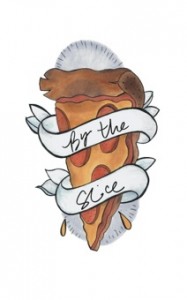 By the Slice
By the Slice
Contributors: Amy Berkowitz, Jennifer Jackson Berry, Sarah A. Chavez, Marissa Crawford, Carrie Hunter, Becca Klaver, Courtney Marie, Carrie Murphy, Alexandra Naughton, Alina Pleskova, Jaclyn Sadicario, Nicole Steinberg, Zoe Tuck
Spooky Girlfriend Press, August 2014
22 pages / $8 Buy from Spooky Girlfriend Press
There is a lot of pizza in this anthology. That’s obvious given the title, but poetry and pizza aren’t always thought of on the same wavelength. Poetry is serious, its nouns get capital letters, it explores deep and dark life mysteries through the brilliance of language, or something like that. Pizza is a delicious food. More than that, pizza is a cultural signifier of everything fast, cheap, and delicious about American culture. Pizza is just one huge carb covered in more carbs. It’s one of the greatest foods we have. But what’s so interesting about this anthology is how easily these poems break down the binary between high and low, pizza and poetry, and presents a group of texts that make fuzzy the boundaries between them. The fatty delicious pizza contrasts nicely with the self-serious reputation of poetry and mixes on the palate to create this new thing, this pizza poem.
It’s safe to say that the line between high and low culture has always been an issue with poetry. The dominant poetic culture is constantly wiggling back and forth between these two poles. The argument comes in different a form with new jargon every decade or so but it’s always along the same lines: low culture is bad and crass, high culture is good and uplifting. Or, low culture is emblematic of the real lives of humans while high culture is elitist and closed off. It may seem obvious that an anthology dealing entirely with pizza would skew strongly in favor of the low, and it really does in a lot of ways, but almost all of these poems deal with subjects worthy of any Serious Poet. There is plenty of fun and humor moving its way through here, but it isn’t a humor anthology. Instead, it’s an anthology that combines pizza-fueled jokes with sincere meditations on what it means to be a depressed person or what a local pizza joint can mean to family.
The very first poem in this collection lays out this high/low distinction and sets the tone for what follows. “Pizza v. Theory” by Amy Berkowitz and Zoe Tuck seems like the perfect poem to begin a pizza poem anthology, one that takes serious the idea of being very unserious. It says, “I am trapped inside a pizza with no hope of escape, / Except for Theory.” It is interesting how theory gets its nice capital “T” here, giving it a sense of importance, but also mocking its self-importance. It continues,
But theory won’t hear me. It’s big, hairy.
Its hair feels spiky if you pet it the wrong direction.
The problem is knowing which direction is right, given
That Mission is that way and this is Valencia and the toilets
At the BART stop always face west.
September 19th, 2014 / 10:00 am
Virtual Book Tour: Jen Michalski
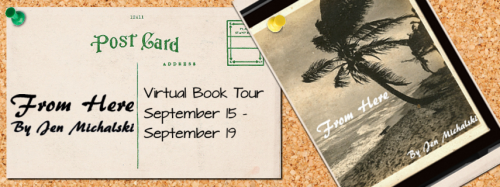 Today is the last stop of Jen Michalski’s virtual book tour celebrating her new collection, From Here. The twelve stories in From Here explore the dislocations and intersections of people searching, running away, staying put. Their physical and emotional landscapes run the gamut, but in the end, they’re all searching for a place to call home.
Today is the last stop of Jen Michalski’s virtual book tour celebrating her new collection, From Here. The twelve stories in From Here explore the dislocations and intersections of people searching, running away, staying put. Their physical and emotional landscapes run the gamut, but in the end, they’re all searching for a place to call home.
***
Never Forever: Where Does the Story End?
“There is no real ending. It’s just the place where you stop the story.”
I don’t like to talk about endings. I don’t like saying goodbye to my partner when she leaves for work in the morning, nor do I gracefully accept when visitors, who only live ten minutes away, must go home. I don’t like finality in general, particularly in my fiction. The best endings, in my opinion, hint at beginnings, offer several paths on which to move forward, let the readers take a short story (or even a novel) beyond the parameters in which the author has set. Like life, fiction should not be a cross section on a slide, to be viewed in isolation under a microscope. It should be a dialogue and a starting point.
In college I was introduced to Raymond Carver, not in a class, but by a roommate who loved the short story “Fat.” When I first read it, I was confused; a waitress recounts to her fellow co-workers her revulsion and confusion over a recent, extremely obese diner, a man who eats more than she has ever witnessed anyone eat and refers to himself as “we.” The story mysteriously ends with the waitress, speaking to the reader: “It is August. My life is going to change. I can feel it.” Would her life change as the result of the encounter with the fat man? Did her perspective of the world grow, and she awaited the fruits of these insights? Was the encounter with fat man completely unrelated to her mysterious epiphany?
40 Points: Witch Piss
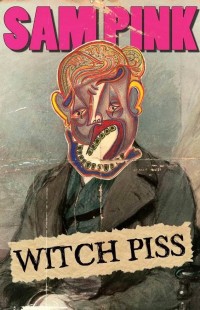 |
Witch Piss
by Sam Pink
Lazy Fascist Press, 2014
112 pages / $8.95 buy from Amazon
|
1. Lot of 40s get drunk in Witch Piss.
2. So, take a pull.
3. King Cobras to be specific.
4. King Cobras are dirt cheap at just $1.99.
5. It’s hard to get an idea of the narrator.
6. Early on, he decides to be a ‘yes man.’
7. “I decided then to only ever encourage people, no matter what they wanted to do. To get through life by saying yes to everything, so no one could say I didn’t get what I wanted, and also so nobody would dislike me.”
8. Most everything he says is deflective in this way.
9. The reader does, I think, get a glimpse of the narrator when he shares his thoughts every now and then.
10. “Imagining myself enlarged, inhaling the smoke off a burning cop as he scream ‘no no no’ – unable to even touch his agonizing face because his skin’s so blistered.”
September 18th, 2014 / 5:18 pm
25 Points: Crystal Eaters
 |
Crystal Eaters
by Shane Jones
Two Dollar Radio, 2014
172 pages / $16.00 buy from Two Dollar Radio or Amazon
|
0. (is) The number of fucks Shane Jones gave when he wrote Crystal Eaters.
1. Like let’s be honest. Crystal Eaters really, is Shane Jones’ giant middle finger to the publishing industry and I love it. (Like, New York City, aka: where the big book-type stuff happens). (*cough* *cough* Penguin Books *cough*).
2. I like that Crystal Eaters was released via a small indie press like Two Dollar Radio and not Penguin Books. Really. And I don’t know why.
3. That’s a lie.
4. Actually, I do know why.
5. When Shane Jones wrote that article about his shitty experience with (publishing and editing) Daniel Fights a Hurricane, I kept thinking to myself: so, for his next book, is he going to try and come up with something super-boring and ultra-generic/fake for the suits so they will sign him for another deal or is he just going to keep doing his own thing and not sell out?
6. Crystal Eaters pretty much answered my question.
7. Really, for me, the experience of reading Crystal Eaters felt a little like watching Alejandro Jodorowsky’s Holy Mountain, in the sense that it is a contemporary fable “of what social engineering caused by greed has done to the modern world, but shows us how to live and not give in to a material world.”
8. (Isn’t it weird how the IMDb synopsis for Holy Mountain just blends beautifully with/and works as a sort of faux-narrative for Crystal Eaters?)
9. The cover, I love. It’s this highly colour-fucked version of Elias Martin’s pen drawing of the Dannemora mine circa 1780-1800. (Or, at least, what I think looks like a highly colour-fucked version of Elias Martin’s pen drawing of the Dannemora mine circa 1780-1800).
10. And it’s neat to think that the art for Crystal Eaters isn’t anything custom-made (like the covers for Light Boxes and Daniel Fights a Hurricane) but something that comes from something that already existed in this world prior to Shane Jones ever even coming up with Crystal Eaters.
September 16th, 2014 / 2:30 pm
A Meditation on Fearless As I Seam by Abigail Zimmer
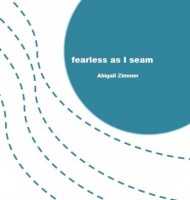 Fearless As I Seam
Fearless As I Seam
by Abigail Zimmer
dancing girl press, 2014
$7 Buy from dancing girl press
The blood will fill your open spaces.
I can’t get to the woods easily from where I live. I seek quiet in the city parks.
One thing people say about New Yorkers is that they are mean. I’ve found people everywhere to be whatever they are. I think here privacy comes where you make it—often in public.
I came to this book & found privacy. I found intimacy & a new language of woods.
In Pittsburgh Abi took off her shoes & ran in the rain. This was private, intimate. She was alone while we watched.
At a rest stop between Muncie & Akron Abi ran up a grassy hill & disappeared. Josh charged his phone. I took two Advil. “Your friend sure has a lot of energy,” a man said to me. I didn’t respond, gave a half grin. I live in New York, I am a woman. I have been trained in certain ways.
This book feels like nature existing in my hands. There is loss. Fragmented traveling & discovery. I hold this close. I understand.
In Chicago she made late-night toast. A crusty sourdough with goat cheese, cucumber, & olive oil. I knew I liked here right then.
A chapbook is a short breath of intensity. It fills with meaning, longing. We understand it as complete.
I say: when I look at you I believe in growth. When I look at you I feel accepted.
Fearless As I Seam opens with closing. A closing of the world. An entering in with a different set of rules. A new vocabulary. All sense of reasoning—an offering. We walk in / we are met with a greeting, a warning, a hinted loss.
Follow me as I go:
I dress in the red earth. There is no laughter.
September 15th, 2014 / 10:00 am
Want For Lion by Paige Taggart
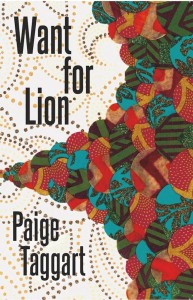 Want For Lion
Want For Lion
by Paige Taggart
Trembling Pillow Press, 2014
116 pages / $16 Buy from Trembling Pillow Press or Amazon
“I’ve always demanded more from a sunset,” says Charlotte Gainsbourg in Lars Van Trier’s Nymph()maniac. ‘Sunset’ being beauty at a distance, untouchable object of desire, lion in a cage. Gainsbourg’s character wants to throw punches, to participate in beauty’s creation. No way to interact with a sunset other than blind admiration. No way to intensify pleasure, or ruin it.
Paige Taggart shares this relationship to beauty. It’s not beauty until you draw blood. In Want For Lion, she wages war on meticulousness, employing a poetics of action, a space where beauty stems from ambition and the art of mistake-making. “There are rooms for mistakes, that shit is human, and land, and plant. Like a quilt of gold floating down the river.”
Beauty is not striking a golden pose, but falling well. I recently fell of my bike, completely unprompted, in the middle of a four way intersection, all the cars stopped at the red. A pedestrian asked if I was hurt, shaking his head, holding in laughter. I waved, “Only my pride!” How beautiful could my fall have been had I been wrapped in a quilt of gold?
*
In the section “Starts with Herds,” Taggart starts three poems with the same phrase, each time breaking it differently:
care about nothing
then care about everything
–
care about nothing then
care about everything
–
care about
nothing
then care
about everything
September 12th, 2014 / 10:00 am
Virtual Book Tour: Désirée Zamorano

Mercy Amado has raised three girls, protecting them from their cheating father by leaving him. But Mercy’s love can only reach so far when her children are adults, as Sylvia, Celeste, and Nataly must make their own choices to fight or succumb, leave or return, to love or pay penance. When tragedy strikes in Sylvia’s life, Mercy, Celeste, and Nataly gather support her, but their familial love may not be enough for them to remain close as the secrets in their histories surface. Forgiveness may not be accepted. Fiercely independent, intelligent, they are The Amado Women.
Today is the last stop of Désirée Zamorano’s virtual book tour celebrating her new novel. Below, read a bit about Désirée’s life as a writer, one that should not be chosen lightly.
More years ago than I care to admit I sat at a Bouchercon (mystery) conference and listened to the writer Patricia Sprinkle speak about the “seasons” in a writer’s life. I had two small children, taught 5th grade, and had committed myself to carve time out of my day to write. But, I had given myself a daily quota that I was daily unable to make. Ms. Sprinkle’s presentation reminded me that there would be different seasons in my life and to not beat myself up for being unable to make my arbitrary quotas. I took her words in, deeply.
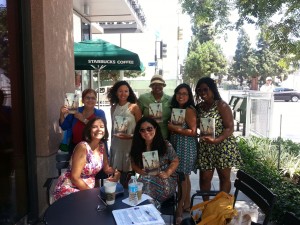
For decades I had one dream: to have a traditionally published novel that I could find on the shelves of a bookstore or library. Ten years ago, overwhelmed by unrealized dreams, and by what seemed like vain hopes and years’ worth of hours of writing (all these words—to what purpose?), I remember lying in bed and praying for God to excise this writing aspiration from my heart. Instead, I found a book that saved my artist’s soul: Making a Literary Life by Carolyn See.
Today is a very different time. Right now, I feel like the poster child for perseverance. When Cinco Puntos accepted my book, which would realize my dream, I released all the bitterness and resentment of my pre-published life. And I realized how ridiculous I had been, all these many years, to allow one thing to define me. One. How ludicrous. What, as they say in the psychology biz, a cognitive distortion. I wouldn’t wish it on my nemesis. Well, maybe.
25 Points: New Tab
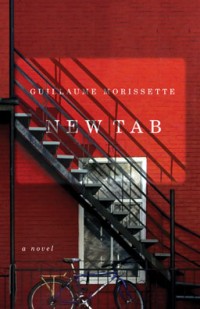 |
New Tab
by Guillaume Morissette
Véhicule Press, 2014
224 pages / $19.95 buy from Véhicule Press or Amazon
|
1. Morissette’s second full-length is set in a hip neighborhood in Montreal. Characters drink cheap beer, ignore their parents, promote cinema.
2. As an American, the most striking cultural moment in this Canadian novel was when two of the characters discussed, without guilt, never having seen The Shawshank Redemption.
3. New Tab tells the story of roommates born on Craigslist—their complex negotiations with landlords, utility companies, each other.
4. The narrator Thomas, a writer in his 20s, sulks through a dayjob designing video games for palmheld devices. At night he sneaks beers into dance clubs and hosts house parties. He attends a Creative Writing Program where he befriends the hard-partying, socially uninhibited Shannon. He falls in love with Romy, a walking distressed sweatshirt. Recalling a breakup conversation with Romy to Shannon, Thomas admits: “it’s like we were talking about golf.”
5. While reading this novel I kept thinking of my mother: Girls grow up faster than boys do.
6. New Tab is a page-turner.
7. I read it on vacation. I also read other books. I kept swiping out of those books to get back to New Tab.
8. I read on beer-stained hammocks and undercrowded chicken buses. I read in a colorful doorway and at a taco bar where body-obsessed Australians were puking up cheladas. I wanted to read New Tab when I couldn’t digest soccer. Like on July 4th during a long lunch when it took me the whole meal to realize Germany was in brown and the French were in black.
9. Morissette has a considerable talent for dialogue, and by that I mean everyone is written the same way.
10. I was eager to read New Tab after reading Morissette’s first book, I Am My Own Betrayal. I remember being deeply moved by this thought in the poem “Vaster Emptiness Achieved”:
We write poetry, people hate us, do we really have to hate each other also?
September 9th, 2014 / 1:46 pm
More Surface: Androgynous and Ambidextrous
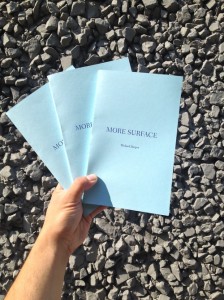 More Surface
More Surface
by Michael Harper
Snoot Books
$10 / Buy from Snoot Books
Leaving poetry readings with my women writer friends, it is not unusual to hear gripes from certain Betty Friedans among us about the Old Boys’ Club of Portland Poets, the Old Boys’ Club of Literature, of the Galaxy, etc. When I hear these statements, I usually reside in a state of polite ambivalence—what would we like these men writers to do, begin their reading with a formal acknowledgement of their privileged white penis status? Well, this is exactly what Michael Harper did at the debut reading of his chapbook, More Surface, one summer rooftop night. Harper’s reading began with the chapbook’s first poem: “Growing Up With A Middle-Class White Penis.” This poem places the reader at a ground zero from which things, phenomena, feelings, etc. are both reported and questioned with an essential ruthlessness. For example, we move from lines like “the penis bones’ connected to the no-crying bone” to “But molting complacency is a naturally learned yearning.” One of my favorite lines from another Portland poet, Emily Kendal Frey, is: “Am I smart enough to be androgynous?” Well, Michael Harper’s poetry is that smart. More Surface exhibits a vast range of perception, voice, form and bravery.
Poems from the chapbook’s first section, “Utopiates,” wander through the device-laden, cyborgian streets of today’s consciousness—hashtags, buzzfeeds, instagram, a wasteland of apps. From “The Conjugation of Friendship:”
to make the ceiling of your bedroom look like stars
because looking at actual stars will make us feel
small & alone
Do you think anyone is staring up
at this same sky app as us?
I don’t know dear it’s not done loading
These lines expose the human needs and fears underpinning our reliance on, our addictions to, our devices. An actual starry sky that once incited wonder and awe, replaced by a technological rendition, a utopiate, that creates an illusion of control and significance. Along with dark humor, this piece possesses a simple sadness, an unabashed isolation: “I feel my hands/ are telephones.” This desire for connection expressed in casual language echoes poets like Frank O’Hara, his Lunch Poems. Works like “The Demollification of Waking” also transcend the “cavern of the cell phone” for the heights of the heart, but here the sentiment is bald and dark, of “migratory flocks of fear.” Fear of getting up in the morning, of staying in bed, fear of repeating past mistakes because what has even been learned:
eight years ago and have to do it
all again knowing just as much
as I don’t know now.
My fear builds an altar in the hearts of others
where I learn that the opposite of fear is losing yourself.
September 8th, 2014 / 10:00 am
